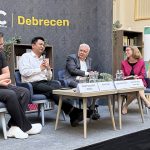Interview with Deputy Mayor of Debrecen, Diána Széles about tourism successes, Debrecen as a caring, livable city
Deputy Mayor of Debrecen Diána Széles, who is responsible for welfare policy, civil relations, youth policy, health and tourism, was asked about work, tasks and results.
According to recent data, Debrecen is among the top ten most visited cities in the first quarter of the year. What is the reason for this result?
By working together, the number of nights spent in the city has doubled in the last ten years.I took over the area in 2014; it was 329,000 then, now it’s 690,000. That’s the measure of tourism performance, which is really about much more than that: hotels are buzzing, people are in town, events are alive…
What has changed in these years? What has been done differently?
We joined forces with the Hungarian Tourist Agency and set the goal that – in addition to Budapest and Lake Balaton – the eastern region would also have a central role. We were not only thinking in Debrecen, but also in the region. If we look at the tourist attractions in our area, there is Hajdúszoboszló 20 kilometres away, or the World Heritage Site of Hortobágy. We thought it was important to have good cooperation with other players, which is why we established, for example, a twin-city relationship with Tiszafüred, so that we could also include Lake Tisza in a common way of thinking. Together, we promote, for example, the Tiszafüred Fish Days and the Hortobágy Horse Riding Days.
So far, everyone has wanted to sell themselves, but we set the goal of joining forces. The main thing is that it should be good for everyone; let’s establish cooperation in the fields of culture and tourism.
What was the focus on? For example, what could Debrecen be offered as a long weekend destination?
We looked at our strengths, and based on this, we wanted to offer a long weekend destination primarily to families with small children. The other goal was to exploit the corporate sector, business travel purposes, because there are very strong economic development processes taking place in the city. The third goal is event tourism, which can offer experiences not only to visitors but also to residents.
So you looked at why it is worth coming to Debrecen?
Over the past 25 years, together with the government, we have pursued an intensive urban development policy, as a result of which we have internationally renowned sports and cultural facilities, but also guests who come because of them, and these events are also of interest to the people of Debrecen. They bring a lively life to our city and at the same time they also bring our good reputation.
These events strengthen tourism, but also the economy, as they create jobs; There are a lot of people working in this sector.
It is important that market players also see the potential in tourist traffic, and thanks to the good numbers more and more people are discovering this area from the perspective of the economy and the service sector.
Those who come here also need to be accommodated. Is there enough accommodation?
Tourism cannot be done without hotels, which is why it is important that a lot of accommodation is being built and renovated. There are international hotel chains here (Mercure, Hilton, ibis Styles), but also family hotels and guesthouses. This is also because our numbers are good, our events are good, and of course the university is here, which also strengthens us with its foreign relations, thousands of foreign students and conferences.
By supporting the operation of the airport, the government is helping Debrecen to achieve its role as a regional center and gateway. In recent years, the proportion of Russian and Israeli tourists has been strong. This was destroyed by the war conflicts, but now we are trying to rebuild what we can. There is now a flight to Israel again, and it is no coincidence that they are happy to come here. This is a safe city, where not only the largest rural religious community is located, but the cultural and gastronomic offer is also diverse and abundant. Religious tourism has an absolute right to exist in Debrecen, as all the historical churches are present in our city.
And why should young people come to Debrecen?
Here are the festivals, the Campus, and other music and gastronomic programs. If they want to have fun, there are high-quality entertainment venues, cafes, events offering cultural experiences, theaters, modern exhibition spaces, the strand in the Great Forest, but the presence of sports is also very strong. We can also serve those interested in tradition and modern opportunities.
The people of Debrecen can say that this is good, of course, but in a city it should also be important that in addition to visitors the people living here feel good.
Tourism should also be viewed from the perspective of the people of Debrecen. We are building the city for them; the first thing is that they feel at home in Debrecen. The important thing is that they are happy and can fulfill themselves, because the city can provide everything: a good nursery, kindergarten, school, family home, good jobs and leisure opportunities.
When people from Debrecen are asked why they love this city, many say that it is because it is their home, everything, or almost everything, connects them here. There is only one hometown and one home. I meet and talk to people from Debrecen in many situations, and I feel that they have a strong attachment to the city, just like I do. Debrecen is the centre of the world for me!
Why can the people of Debrecen love their city?
Because it has everything here, just like in Budapest, only on a smaller scale. I can go to the theater, the swimming pool, take the kids to Sziget-Kék, to a museum, a modern gallery, skate, cycle, there are dog runs, parks, playgrounds. This is a livable place where everyone can find themselves, receive a good education, and be fulfilled in their work. As a politician, my concern is that the people who live here are happy, but also that Debrecen has always been and still is one of the centres of the country, of Hungarians. This city has a soul.
Speaking of which, the term ‘livable city’ has been familiar for some time now, as part of the D2030 urban development programme, alongside the term ‘caring city’. How can this be filled with content?
A caring city is not just a slogan. Many people are working very hard to ensure that this programme accompanies the people of Debrecen throughout their lives. When a tiny baby is born, the network of health care providers (through the Debrecen Institute for Primary Care and Health Promotion) is already there.
We have a very good network of crèches, we are a national centre for methodology, and our institutions are of high quality. So if anyone asks me where to take their child, I would suggest either near their workplace or near their home, because they are all equally good.
The same can be said of the kindergartens, with the difference that specialisation is already starting to take place there, so that has to be taken into account. We take care of children with special educational needs and disabilities. We have dog therapy sessions, but we also have a free TSMT movement programme, which was originally designed for 50-60 children and now has over 600 participants.
What about school children?
Although the schools are not run by the city, we do not let go of the hands of the people of Debrecen; nearly 13,000 children attend the complex health screenings in Pósa Street every year. We see that they are under the spell of the digital world, which takes them away from their communities and playgrounds, but we try to give them the experience of movement. We organise them various playful championships; the aim is to get them moving, to get them playing sport. Lifestyle changes and proper nutrition are important; we can help with that too. We started the Smart Plate programme on St. Anna’s Street, where we offer free dietetic advice.
I believe that if a child brings a good attitude to life into the family, it can change the parents.
It’s also important to look at children’s mental health issues; bullying, for example, is something that can’t be overlooked. We see that we have to talk to the upper school children about addictions, the dangers of smoking, drugs and alcohol. I’m also very proud that we teach CPR to every student in Debrecen.
So far we have mainly talked about young people. And the adults?
We would like to give people who work the opportunity to take advantage of free exercise opportunities within the framework of +Move, Debrecen!” initiative, be it yoga, back exercises, zumba, for example. Or there are the strength training sessions in fitness parks, where, if you walk in, there is a professional trainer waiting for you, paid for by the municipality. Only on Szent Anna Street we ask for a city card, because we want to give priority to the people of Debrecen.
When we talk about the elderly, I see it as my mission to look after them. They are the ones who, if they are left alone, we have to open the door to them. They need to be taken care of, programmes need to be offered to them. This is what the Municipal Social Service’s day institutions and clubs serve.
“We are Debrecen together” is not just a slogan for me either. We want to take care of everyone who lives in the city. The Debrecen Charity Board, where we work with nearly 29 NGOs, is a great help in this. In addition to the senior citizens’ clubs, there is also our home help programme, which is now focusing more on people living in the suburbs.
Do you go to their house?
Yes, for those who require it. However, there are things that Debrecen residents need to get out of their homes for: “Move, Debrecen!’s” walking programs on Tuesdays and Thursdays at the Mist Theatre are very popular. Here, participants are given headphones and can listen to educational lectures about how the spleen, kidneys and other organs work while walking.
As DAEFI Director Csaba Papp jokingly said, “if you go on these walks for years, you can almost get a medical degree, you can gain so much knowledge about health, our bodies and our organs.”
So far we have talked about others, but what does the deputy mayor say about what kind of city she would like to live in?
Where care and assistance are natural. There are many actors in the caring city programme, where the government, the university, the churches, civil organisations and the municipality cooperate. Everyone takes it seriously and takes care of their own area, which is why I am very grateful to all the workers and volunteers. This is a very good collaboration; one where there is a sense of love and belonging. For me, this is Debrecen.
Source and photo credit:dehir.hu


